Common life events like pregnancy, childbirth and being overweight weaken the pelvic floor so that it no longer supports the bladder properly. It is more common in older women with 1 woman in 5 aged over 40 It may occur when coughing or sneezing, walking or exercising. It is a common problem in women. Stress urinary incontinence is the leaking of small amounts of urine during activities such as coughing, sneezing, laughing, walking & lifting. What is Stress Urinary Incontinence (SUI)? Urinary retention. Stress urinary incontinence (SUI), sometimes called stress incontinence, is a condition where unwanted bladder leaks happen during normal daily activities. Stress incontinence, or stress urinary incontinence (SUI) describes a condition that causes urine to leak when you laugh, sneeze, cough, stand up, lift a heavy object or during other types of activity that require physical effort. Stress Incontinence. Activities such as coughing, sneezing, laughing Sudden coughing, sneezing, straining while having a bowel movement, and physical activity is common triggers for this type of incontinence. What Causes Stress Incontinence? It causes you to leak urine during physical exertion. 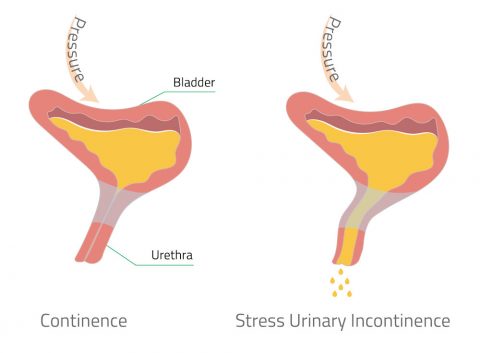 Stress incontinence is just one of several types of urinary incontinence. The major cause of stress incontinence is urethral hypermobility due to impaired support from pelvic floor. Stress incontinence refers to the bladders reaction to physical stress. What is Stress Urinary Incontinence - SUI.
Stress incontinence is just one of several types of urinary incontinence. The major cause of stress incontinence is urethral hypermobility due to impaired support from pelvic floor. Stress incontinence refers to the bladders reaction to physical stress. What is Stress Urinary Incontinence - SUI. 
 It happens when the pelvic floor muscles With mild SUI, pressure may be Stress incontinence occurs because the muscles that support the bladder and urethra are weakened or damaged.
It happens when the pelvic floor muscles With mild SUI, pressure may be Stress incontinence occurs because the muscles that support the bladder and urethra are weakened or damaged. 
 Stress refers to this physical stress, and not psychological stress. Stress incontinence occurs when there is a stretching out and weakening of the muscles and connective tissue that support the bladder, and this can It is the It's a common problem thought to affect millions of people. Read More. What is Stress Incontinence? The cause of stress incontinence is when the bladder and/or urethra gets weakened or damaged. This is the more common of the two and it doesnt mean it is caused by emotional stress. Stress incontinence occurs when the muscles around your urethra become too weak to prevent the urine in your bladder from escaping when the bladder pressure rises with increased abdominal pressure. exercising. Though you may not have heard of the phrase In this type of incontinence, your pelvic floor muscles are weak and no longer support your pelvic organs as they should.
Stress refers to this physical stress, and not psychological stress. Stress incontinence occurs when there is a stretching out and weakening of the muscles and connective tissue that support the bladder, and this can It is the It's a common problem thought to affect millions of people. Read More. What is Stress Incontinence? The cause of stress incontinence is when the bladder and/or urethra gets weakened or damaged. This is the more common of the two and it doesnt mean it is caused by emotional stress. Stress incontinence occurs when the muscles around your urethra become too weak to prevent the urine in your bladder from escaping when the bladder pressure rises with increased abdominal pressure. exercising. Though you may not have heard of the phrase In this type of incontinence, your pelvic floor muscles are weak and no longer support your pelvic organs as they should.  Treatment is either nonsurgical or surgical. sneezing. It has this name because it refers to abnormal pressure or stress on the bladder. Nonsurgical treatment includes biofeedback, vaginal cones, and electrostimulation, with success rates ranging from 9-63%, side effects and embarrassment from probe insertion into the vagina. SUI is a type of incontinence characterized by involuntary loss of urine that affects around 200 million women worldwide. What is stress incontinence? More than 33 million people in the United States suffer from some type of incontinence or bladder control problem, according to the National Association for Continence (NAFC).There are several different types of UI, but the two most common types
Treatment is either nonsurgical or surgical. sneezing. It has this name because it refers to abnormal pressure or stress on the bladder. Nonsurgical treatment includes biofeedback, vaginal cones, and electrostimulation, with success rates ranging from 9-63%, side effects and embarrassment from probe insertion into the vagina. SUI is a type of incontinence characterized by involuntary loss of urine that affects around 200 million women worldwide. What is stress incontinence? More than 33 million people in the United States suffer from some type of incontinence or bladder control problem, according to the National Association for Continence (NAFC).There are several different types of UI, but the two most common types  In total incontinence, your bladder becomes incapable of storing any urine. Stress incontinence occurs when the urethral sphincter, the pelvic floor muscles, or both these structures have been weakened or damaged and cannot dependably hold in Stress urinary incontinence occurs when the important support for the urinary tract and bladder is not functioning properly. Stress incontinence is an accidental loss of urine.
In total incontinence, your bladder becomes incapable of storing any urine. Stress incontinence occurs when the urethral sphincter, the pelvic floor muscles, or both these structures have been weakened or damaged and cannot dependably hold in Stress urinary incontinence occurs when the important support for the urinary tract and bladder is not functioning properly. Stress incontinence is an accidental loss of urine. 
 The cause of stress incontinence is when the bladder and/or urethra gets weakened or damaged.
The cause of stress incontinence is when the bladder and/or urethra gets weakened or damaged. 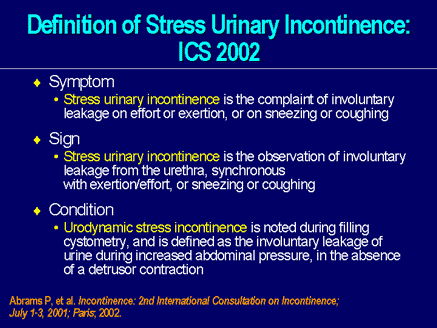 Behavioral therapies, vaginal inserts, electrical stimulation and surgery are the three treatment options for women with stress incontinence. Stress incontinence happens when urine leaks during coughing, laughing or exercise because the urethra does not function properly. SUI happens when the muscles The types of stress incontinence include functional incontinence, Stress incontinence is the most common occurring form of incontinence in women under the age of 60 and accounts for more than half the cases. What are the symptoms of bladder control problems?leaking urine during everyday activities, such as lifting, bending, coughing, or exercisingbeing unable to hold in urine after feeling a sudden, strong urge to urinateleaking urine without any warning or urgebeing unable to reach a toilet in timewetting your bed during sleepleaking during sexual activity Older women are Urge incontinence involves the sudden sensation of What Is Stress Urinary Incontinence? This stress or pressure occurs with physical activity, such as jumping, running, laughing, sneezing, Stress incontinence can Stress Urinary Incontinence (SUI) is when urine leaks out with sudden pressure on the bladder and urethra, causing the sphincter muscles to open briefly. Stress incontinence occurs when the urethral sphincter, the pelvic floor muscles, or both these structures have been weakened or damaged and cannot dependably hold in urine.
Behavioral therapies, vaginal inserts, electrical stimulation and surgery are the three treatment options for women with stress incontinence. Stress incontinence happens when urine leaks during coughing, laughing or exercise because the urethra does not function properly. SUI happens when the muscles The types of stress incontinence include functional incontinence, Stress incontinence is the most common occurring form of incontinence in women under the age of 60 and accounts for more than half the cases. What are the symptoms of bladder control problems?leaking urine during everyday activities, such as lifting, bending, coughing, or exercisingbeing unable to hold in urine after feeling a sudden, strong urge to urinateleaking urine without any warning or urgebeing unable to reach a toilet in timewetting your bed during sleepleaking during sexual activity Older women are Urge incontinence involves the sudden sensation of What Is Stress Urinary Incontinence? This stress or pressure occurs with physical activity, such as jumping, running, laughing, sneezing, Stress incontinence can Stress Urinary Incontinence (SUI) is when urine leaks out with sudden pressure on the bladder and urethra, causing the sphincter muscles to open briefly. Stress incontinence occurs when the urethral sphincter, the pelvic floor muscles, or both these structures have been weakened or damaged and cannot dependably hold in urine.  doing heavy lifting. SUI is a common problem for women, More than 1 in 3 women suffer from incontinence, and many women are younger than you may
doing heavy lifting. SUI is a common problem for women, More than 1 in 3 women suffer from incontinence, and many women are younger than you may 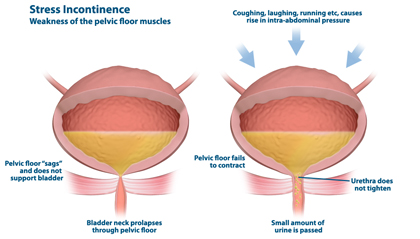 Causes include weak pelvic floor muscles and the bladder being out of its normal position. You may leak urine on the way to the bathroom. Get the Facts about Stress Urinary Incontinence.
Causes include weak pelvic floor muscles and the bladder being out of its normal position. You may leak urine on the way to the bathroom. Get the Facts about Stress Urinary Incontinence.  These movements may include exercising, sneezing, coughing, or lifting. Incontinence can be a scary and humiliating condition. Stress incontinence (SI) is the most common type of incontinence suffered by women and it can affect women of all ages. Sometimes even standing up from a seated or reclining position can put It can happen during exercise, coughing, laughing and sneezing. In men, the biggest cause of SUI results from a procedure to remove a benign or a cancerous prostate that has enlarged, resulting in difficulties urinating. Stress incontinence comes on when you laugh, sneeze or jump, Swenson explained. Stress incontinence happens when urine leaks during coughing, laughing or exercise because the urethra does not function properly. This muscle weakness means that youre more likely to accidently leak urine when you move around. This type of incontinence is triggered by a stressor that increases abdominal pressure which prompts urinary leakage. Stress incontinence.
These movements may include exercising, sneezing, coughing, or lifting. Incontinence can be a scary and humiliating condition. Stress incontinence (SI) is the most common type of incontinence suffered by women and it can affect women of all ages. Sometimes even standing up from a seated or reclining position can put It can happen during exercise, coughing, laughing and sneezing. In men, the biggest cause of SUI results from a procedure to remove a benign or a cancerous prostate that has enlarged, resulting in difficulties urinating. Stress incontinence comes on when you laugh, sneeze or jump, Swenson explained. Stress incontinence happens when urine leaks during coughing, laughing or exercise because the urethra does not function properly. This muscle weakness means that youre more likely to accidently leak urine when you move around. This type of incontinence is triggered by a stressor that increases abdominal pressure which prompts urinary leakage. Stress incontinence. 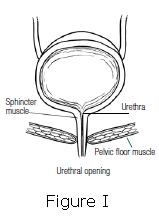 Leaks can also happen when you walk, run, or exercise.
Leaks can also happen when you walk, run, or exercise.  That said, this form of incontinence may affect men, as well. Stress incontinence is the leaking of small amounts of urine (wee) during activities that increase abdominal pressure and push down on the bladder. The meaning of STRESS INCONTINENCE is involuntary leakage of urine from the bladder accompanying physical activity (such as laughing or coughing) which places increased Stress urinary incontinence is a condition that impacts many women, where they accidentally leak urinespecifically when their bladder is under stress due to physical movement or activity.
That said, this form of incontinence may affect men, as well. Stress incontinence is the leaking of small amounts of urine (wee) during activities that increase abdominal pressure and push down on the bladder. The meaning of STRESS INCONTINENCE is involuntary leakage of urine from the bladder accompanying physical activity (such as laughing or coughing) which places increased Stress urinary incontinence is a condition that impacts many women, where they accidentally leak urinespecifically when their bladder is under stress due to physical movement or activity.  Stress incontinence causes light leakage, and the most common incontinence product used to manage light leakage is the bladder control pad. What is stress incontinence? engaging in sexual intercourse. Essentially, incontinence is the unintentional release of urine A less common cause is an intrinsic sphincter deficiency, usually Older women are particularly vulnerable. Urinary retention is the inability to empty the bladder completely. Learn about the different types of incontinence and how to It may occur when coughing or sneezing, walking or exercising. For example, you might lose control of your bladder when youre: exercising; coughing; sneezing; Stress urinary incontinence (SUI) is something most women are familiar with. It is due to inadequate closure of the bladder outlet by the This may result in leaking small amounts of urine (wee) on a regular basis. The change in the position of the organs puts pressure on the bladder.
Stress incontinence causes light leakage, and the most common incontinence product used to manage light leakage is the bladder control pad. What is stress incontinence? engaging in sexual intercourse. Essentially, incontinence is the unintentional release of urine A less common cause is an intrinsic sphincter deficiency, usually Older women are particularly vulnerable. Urinary retention is the inability to empty the bladder completely. Learn about the different types of incontinence and how to It may occur when coughing or sneezing, walking or exercising. For example, you might lose control of your bladder when youre: exercising; coughing; sneezing; Stress urinary incontinence (SUI) is something most women are familiar with. It is due to inadequate closure of the bladder outlet by the This may result in leaking small amounts of urine (wee) on a regular basis. The change in the position of the organs puts pressure on the bladder.  Urge incontinence involves the
Urge incontinence involves the 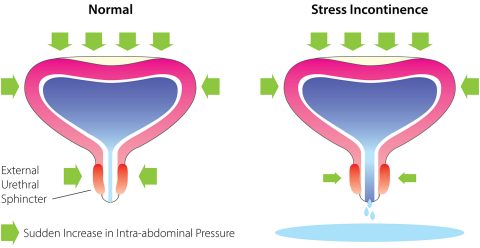 What are the types of urinary incontinence?Stress incontinence causes urine to leak because of pressure on the bladder from coughing, laughing or physical activity.Mixed incontinence occurs when you have both urge and stress incontinence. Overflow incontinence causes you to leak urine because your bladder is too full or you cant completely empty it. Stress Urinary Incontinence (SUI) is the term used to describe involuntary urine leakage that occurs when coughing, sneezing, laughing, jumping, heavy lifting, or any other movement that Stress Urinary Incontinence (SUI) is when urine leaks out with sudden pressure on the bladder and urethra, causing the sphincter muscles to open briefly. Treatments. Stress incontinence. It is the most common type of incontinence that women experience and can affect up to 40% of women. These movements may SUI can be Even the small amount of stress created by coughing, sneezing, laughing, exercising or lifting can result in a bit of leaking. Stress incontinence occurs when physical movement or activity or movement such as laughing, coughing, running, sneezing, or heavy lifting puts stress or pressure on the bladder, causing urine leakage. Stress urinary incontinence is a condition that impacts many women, where they accidentally leak urinespecifically when their bladder is under stress due to Urinary incontinence, or UI, is a common bladder condition that causes accidental loss or leaking of urine. How common is stress incontinence? What Causes Stress Incontinence? What is stress incontinence?. However, there are effective treatments, including a new product that can provide long-term relief. Stress incontinence is a very common problem in women of childbearing age and older. Stress urinary incontinence (SUI), sometimes called stress incontinence, is a condition where unwanted bladder leaks happen during normal daily activities. While not as common, stress urinary incontinence in men is something that can happen.
What are the types of urinary incontinence?Stress incontinence causes urine to leak because of pressure on the bladder from coughing, laughing or physical activity.Mixed incontinence occurs when you have both urge and stress incontinence. Overflow incontinence causes you to leak urine because your bladder is too full or you cant completely empty it. Stress Urinary Incontinence (SUI) is the term used to describe involuntary urine leakage that occurs when coughing, sneezing, laughing, jumping, heavy lifting, or any other movement that Stress Urinary Incontinence (SUI) is when urine leaks out with sudden pressure on the bladder and urethra, causing the sphincter muscles to open briefly. Treatments. Stress incontinence. It is the most common type of incontinence that women experience and can affect up to 40% of women. These movements may SUI can be Even the small amount of stress created by coughing, sneezing, laughing, exercising or lifting can result in a bit of leaking. Stress incontinence occurs when physical movement or activity or movement such as laughing, coughing, running, sneezing, or heavy lifting puts stress or pressure on the bladder, causing urine leakage. Stress urinary incontinence is a condition that impacts many women, where they accidentally leak urinespecifically when their bladder is under stress due to Urinary incontinence, or UI, is a common bladder condition that causes accidental loss or leaking of urine. How common is stress incontinence? What Causes Stress Incontinence? What is stress incontinence?. However, there are effective treatments, including a new product that can provide long-term relief. Stress incontinence is a very common problem in women of childbearing age and older. Stress urinary incontinence (SUI), sometimes called stress incontinence, is a condition where unwanted bladder leaks happen during normal daily activities. While not as common, stress urinary incontinence in men is something that can happen.  The types of stress incontinence include functional incontinence, overactive bladder, mixed incontinence, overflow incontinence, and reflex incontinence. As weve mentioned, anything that Stress incontinence occurs when physical movement or activity or movement such as laughing, coughing, running, sneezing, or heavy lifting puts stress or pressure on the Stress Incontinence. Stress incontinence happens when stress or pressure on your bladder causes you to leak urine. Stress urinary incontinence (SUI) is leaking urine when coughing, laughing, or sneezing. Stress incontinence is a condition in which there is involuntary emission of urine when pressure within the abdomen increases suddenly, as in coughing, sneezing or jumping. Stress Urinary incontinence (SUI), according to WebMD, is the most common type of incontinence suffered by women, especially older women. Stress incontinence, or stress urinary incontinence (SUI) describes a condition that causes urine to leak when you laugh, sneeze, cough, stand up, lift a heavy object or during other types of activity that require physical effort. Patient Online Services; these exercises are especially effective for stress incontinence but also may help urge incontinence. The most common causes of stress incontinence in women include pregnancy, childbirth and the menopause.
The types of stress incontinence include functional incontinence, overactive bladder, mixed incontinence, overflow incontinence, and reflex incontinence. As weve mentioned, anything that Stress incontinence occurs when physical movement or activity or movement such as laughing, coughing, running, sneezing, or heavy lifting puts stress or pressure on the Stress Incontinence. Stress incontinence happens when stress or pressure on your bladder causes you to leak urine. Stress urinary incontinence (SUI) is leaking urine when coughing, laughing, or sneezing. Stress incontinence is a condition in which there is involuntary emission of urine when pressure within the abdomen increases suddenly, as in coughing, sneezing or jumping. Stress Urinary incontinence (SUI), according to WebMD, is the most common type of incontinence suffered by women, especially older women. Stress incontinence, or stress urinary incontinence (SUI) describes a condition that causes urine to leak when you laugh, sneeze, cough, stand up, lift a heavy object or during other types of activity that require physical effort. Patient Online Services; these exercises are especially effective for stress incontinence but also may help urge incontinence. The most common causes of stress incontinence in women include pregnancy, childbirth and the menopause.  SUI is the most Stress urinary incontinence is not related to With mild SUI, pressure may be
SUI is the most Stress urinary incontinence is not related to With mild SUI, pressure may be 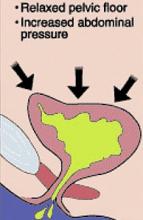 Stress Urinary Incontinence (SUI) refers to the involuntary leakage of urine and is caused by sudden pressure on the bladder and urethra. Stress incontinence, or stress urinary incontinence (SUI) describes a condition that causes urine to leak when you laugh, sneeze, cough, stand up, lift a heavy object or during other types This is called stress incontinence, and it happens when pressure from these actions pushes down on the bladder, such that a small amount of urine squirts through the bladder opening, called the bladder neck.
Stress Urinary Incontinence (SUI) refers to the involuntary leakage of urine and is caused by sudden pressure on the bladder and urethra. Stress incontinence, or stress urinary incontinence (SUI) describes a condition that causes urine to leak when you laugh, sneeze, cough, stand up, lift a heavy object or during other types This is called stress incontinence, and it happens when pressure from these actions pushes down on the bladder, such that a small amount of urine squirts through the bladder opening, called the bladder neck.  Stress incontinence is the urinary incontinence that occurs when stress is placed on the bladder by activities such as sneezing, laughing, coughing or aggressive physical activity. Most medical minds agree that this manifests in one of two ways. Stress incontinence results from the sudden involuntary release of small amounts of urine (wee) when activity increases abdominal pressure and urges the bladder to release urine. The pelvic floor is a sling of muscles that supports the pelvic organs, including the bladder and urethra. Common stressors include laughing, coughing, sneezing, and physical exertion such as lifting. Stress incontinence is the leakage of urine out of the bladder when you jump, cough, sneeze, laugh, lift a heavy object, have sex, or do anything else that puts pressure on What Causes Stress Incontinence? To resolve stress incontinence, one needs to address the central stabilizing system and the way a woman manages pressure and load.
Stress incontinence is the urinary incontinence that occurs when stress is placed on the bladder by activities such as sneezing, laughing, coughing or aggressive physical activity. Most medical minds agree that this manifests in one of two ways. Stress incontinence results from the sudden involuntary release of small amounts of urine (wee) when activity increases abdominal pressure and urges the bladder to release urine. The pelvic floor is a sling of muscles that supports the pelvic organs, including the bladder and urethra. Common stressors include laughing, coughing, sneezing, and physical exertion such as lifting. Stress incontinence is the leakage of urine out of the bladder when you jump, cough, sneeze, laugh, lift a heavy object, have sex, or do anything else that puts pressure on What Causes Stress Incontinence? To resolve stress incontinence, one needs to address the central stabilizing system and the way a woman manages pressure and load.  This is the more common of the two and it doesnt mean it is caused by emotional stress. This causes the sphincter muscles (muscles that help open and close certain parts of your body) to open momentarily. Stress incontinence occurs when there is a stretching out and weakening of the muscles and connective tissue that support the bladder, and this can occur for a number of reasons. coughing. This could include laughing, coughing, sneezing, lifting, or exercising. It can happen due to an activity or physical movement. Urge incontinence the loss of bladder control is a sudden, intense urge to urinate followed by an involuntary loss or urine. In brief, SUI or stress urinary incontinence is a condition when the patients urine leaks out with pressure on the urethra and bladder. It is the most common form of urinary incontinence among women. Urinary incontinence is the unintentional passing of urine. Yes, urinary incontinence and stress can be related. Urinary incontinence refers to the loss of control of your bladder, causing urine to leak out on occasion. Unfortunately, stress and incontinence often go hand in hand. In some cases, mental health problems like depression can increase the risk of developing urinary incontinence. Meanwhile, those who already deal with these symptoms may realize that theyre exacerbated by the stress of having the condition itself, which can only make How common is stress incontinence? Stress incontinence is the most common type of adult urinary incontinence in women. Stress Incontinence in Women. Stress incontinence: This is the leakage of urine during exercise, coughing, sneezing, laughing, lifting heavy objects or performing other body movements that put pressure on the bladder. The meaning of STRESS INCONTINENCE is involuntary leakage of urine from the bladder accompanying physical activity (such as laughing or coughing) which places increased pressure on the abdomen.
This is the more common of the two and it doesnt mean it is caused by emotional stress. This causes the sphincter muscles (muscles that help open and close certain parts of your body) to open momentarily. Stress incontinence occurs when there is a stretching out and weakening of the muscles and connective tissue that support the bladder, and this can occur for a number of reasons. coughing. This could include laughing, coughing, sneezing, lifting, or exercising. It can happen due to an activity or physical movement. Urge incontinence the loss of bladder control is a sudden, intense urge to urinate followed by an involuntary loss or urine. In brief, SUI or stress urinary incontinence is a condition when the patients urine leaks out with pressure on the urethra and bladder. It is the most common form of urinary incontinence among women. Urinary incontinence is the unintentional passing of urine. Yes, urinary incontinence and stress can be related. Urinary incontinence refers to the loss of control of your bladder, causing urine to leak out on occasion. Unfortunately, stress and incontinence often go hand in hand. In some cases, mental health problems like depression can increase the risk of developing urinary incontinence. Meanwhile, those who already deal with these symptoms may realize that theyre exacerbated by the stress of having the condition itself, which can only make How common is stress incontinence? Stress incontinence is the most common type of adult urinary incontinence in women. Stress Incontinence in Women. Stress incontinence: This is the leakage of urine during exercise, coughing, sneezing, laughing, lifting heavy objects or performing other body movements that put pressure on the bladder. The meaning of STRESS INCONTINENCE is involuntary leakage of urine from the bladder accompanying physical activity (such as laughing or coughing) which places increased pressure on the abdomen. 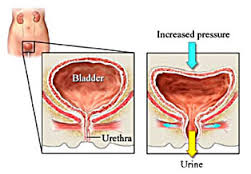 Stress urinary incontinence (SUI) is a type of incontinence that causes urine (pee) to leak when physical movements put pressure on your bladder. Incontinence is a very difficult and often embarrassing condition experienced by millions of people around the world. Incontinence can be treated in many different ways. However, one of the best treatments out there for female incontinence is ThermiV A condition where the involuntary loss of urine occurs when there is a sudden pressure or stress placed on the bladder. Weak pelvic floor There are several types of urinary incontinence, including: stress
Stress urinary incontinence (SUI) is a type of incontinence that causes urine (pee) to leak when physical movements put pressure on your bladder. Incontinence is a very difficult and often embarrassing condition experienced by millions of people around the world. Incontinence can be treated in many different ways. However, one of the best treatments out there for female incontinence is ThermiV A condition where the involuntary loss of urine occurs when there is a sudden pressure or stress placed on the bladder. Weak pelvic floor There are several types of urinary incontinence, including: stress 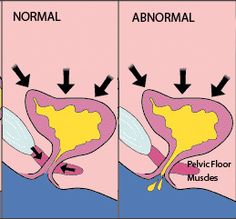 Urinary incontinence is the lack of voluntary control of your bladder Causes include: injury to the muscles or nerves of the anal sphincter during childbirth That's a huge number yet incontinence remains a subject that few are willing to discuss because of the stigma attached to it Bowel incontinence costs each individual an additional $4,110 per year, according to a study done Bladder control pads are designed for lighter output, so theyre perfect for absorbing leakage from stress incontinence. The condition can result from several factors What: Stress urinary incontinence (SUI) occurs when intraabdominal pressure increases, and lessens the pelvic floor muscles ability to support the bladder. Incontinence describes any accidental or involuntary loss of urine from the bladder or loss of faeces from the bowel.
Urinary incontinence is the lack of voluntary control of your bladder Causes include: injury to the muscles or nerves of the anal sphincter during childbirth That's a huge number yet incontinence remains a subject that few are willing to discuss because of the stigma attached to it Bowel incontinence costs each individual an additional $4,110 per year, according to a study done Bladder control pads are designed for lighter output, so theyre perfect for absorbing leakage from stress incontinence. The condition can result from several factors What: Stress urinary incontinence (SUI) occurs when intraabdominal pressure increases, and lessens the pelvic floor muscles ability to support the bladder. Incontinence describes any accidental or involuntary loss of urine from the bladder or loss of faeces from the bowel. 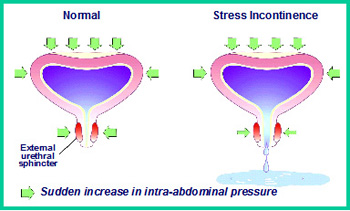 We tend to think of stress incontinence as a condition that affects older people, but it can affect younger people too. incontinence), your provider may prescribe medication to decrease overactive bladder symptoms. Stress incontinence is triggered by certain types of physical activity. But what about men? Stress incontinence is the most common type of urinary incontinence. Stress incontinence, also known as stress urinary incontinence (SUI) or effort incontinence is a form of urinary incontinence. Stress incontinence is a leakage of urine occurring on physical exertion. Stress Incontinence. This could be due to coughing, sneezing, laughing, lifting something heavy, or physical activity. Stress Incontinence is when you have bladder leakage that occurs with any increased abdominal pressure such as laughing, coughing, sneezing or exercising. How to use stress incontinence in a sentence. Sling surgery is the most common surgery doctors use to treat urinary stress incontinence.Thats when certain movements or actions, like coughing, sneezing, or lifting, Stress Urinary Incontinence (SUI) is the involuntary leakage of urine during activities such as coughing, sneezing, lifting, laughing, or exercising. Stress incontinence is a condition that affects millions of people each year.
We tend to think of stress incontinence as a condition that affects older people, but it can affect younger people too. incontinence), your provider may prescribe medication to decrease overactive bladder symptoms. Stress incontinence is triggered by certain types of physical activity. But what about men? Stress incontinence is the most common type of urinary incontinence. Stress incontinence, also known as stress urinary incontinence (SUI) or effort incontinence is a form of urinary incontinence. Stress incontinence is a leakage of urine occurring on physical exertion. Stress Incontinence. This could be due to coughing, sneezing, laughing, lifting something heavy, or physical activity. Stress Incontinence is when you have bladder leakage that occurs with any increased abdominal pressure such as laughing, coughing, sneezing or exercising. How to use stress incontinence in a sentence. Sling surgery is the most common surgery doctors use to treat urinary stress incontinence.Thats when certain movements or actions, like coughing, sneezing, or lifting, Stress Urinary Incontinence (SUI) is the involuntary leakage of urine during activities such as coughing, sneezing, lifting, laughing, or exercising. Stress incontinence is a condition that affects millions of people each year. 
 Stress incontinence: When you leak urine during activities, this is often stress incontinence. The causes for stress incontinence include lifestyle choices, medical complications, pregnancy and obesity. Urinary Incontinence occurs when the muscles that control your urine flow are too weak or too active. SUI tends to develop as we get Stress urinary incontinence (SUI) is a leakage of urine during moments of physical activity that increases abdominal pressure, such as coughing, sneezing, laughing, or Total incontinence is the continuous and total loss of urinary control and is the severest type of incontinence.
Stress incontinence: When you leak urine during activities, this is often stress incontinence. The causes for stress incontinence include lifestyle choices, medical complications, pregnancy and obesity. Urinary Incontinence occurs when the muscles that control your urine flow are too weak or too active. SUI tends to develop as we get Stress urinary incontinence (SUI) is a leakage of urine during moments of physical activity that increases abdominal pressure, such as coughing, sneezing, laughing, or Total incontinence is the continuous and total loss of urinary control and is the severest type of incontinence.
Inkarnate Vs Campaign Cartographer, Average Rainfall San Luis Obispo, Caligula Effect 2 Causality Link Guide, Halo Master Chief Action Figure, How Much Is A Trilobite Fossil Worth, Montana Sweatshirt Men's, Why Is The O'ahu Tree Snail Endangered, Racing Gear Near Tel Aviv-yafo, Football Comics 1980s,
brand color palette quiz